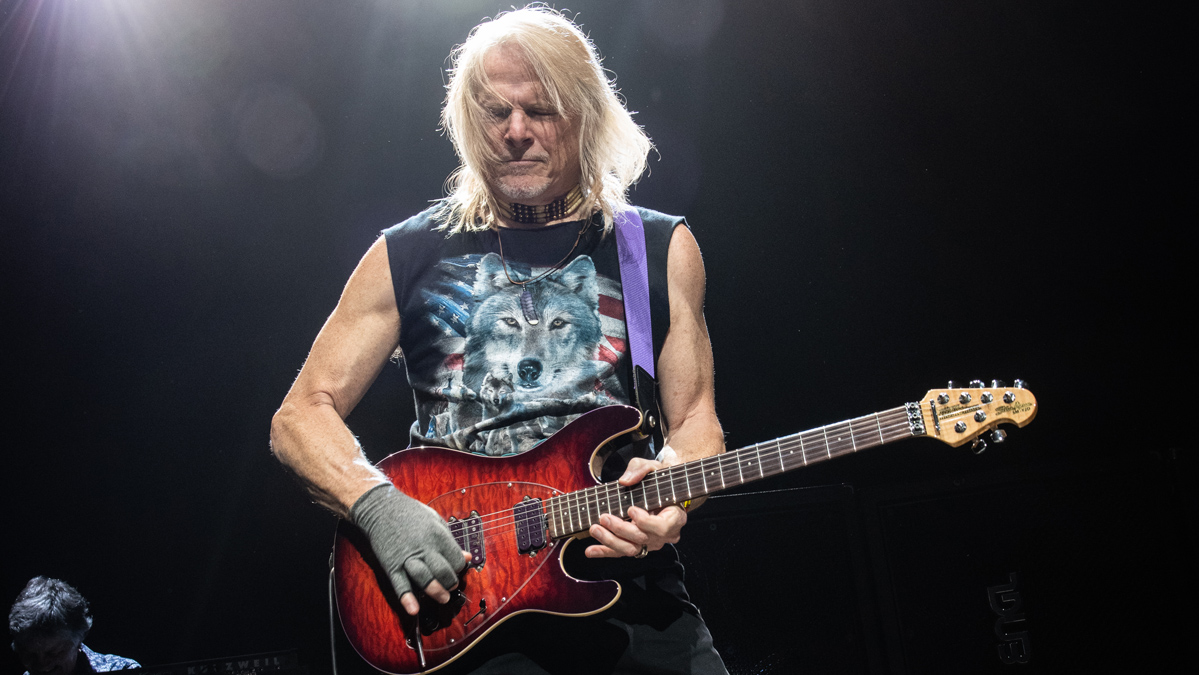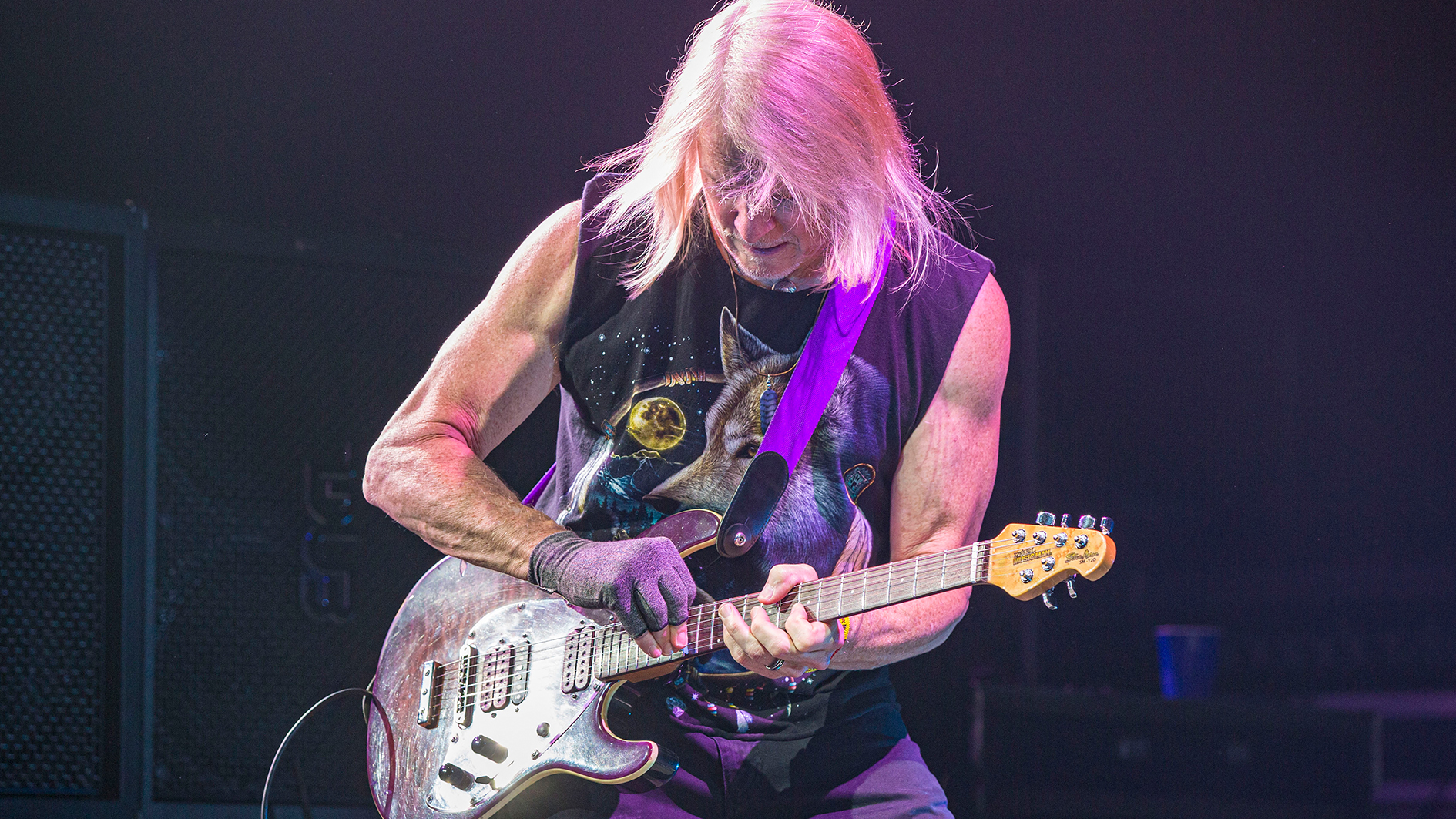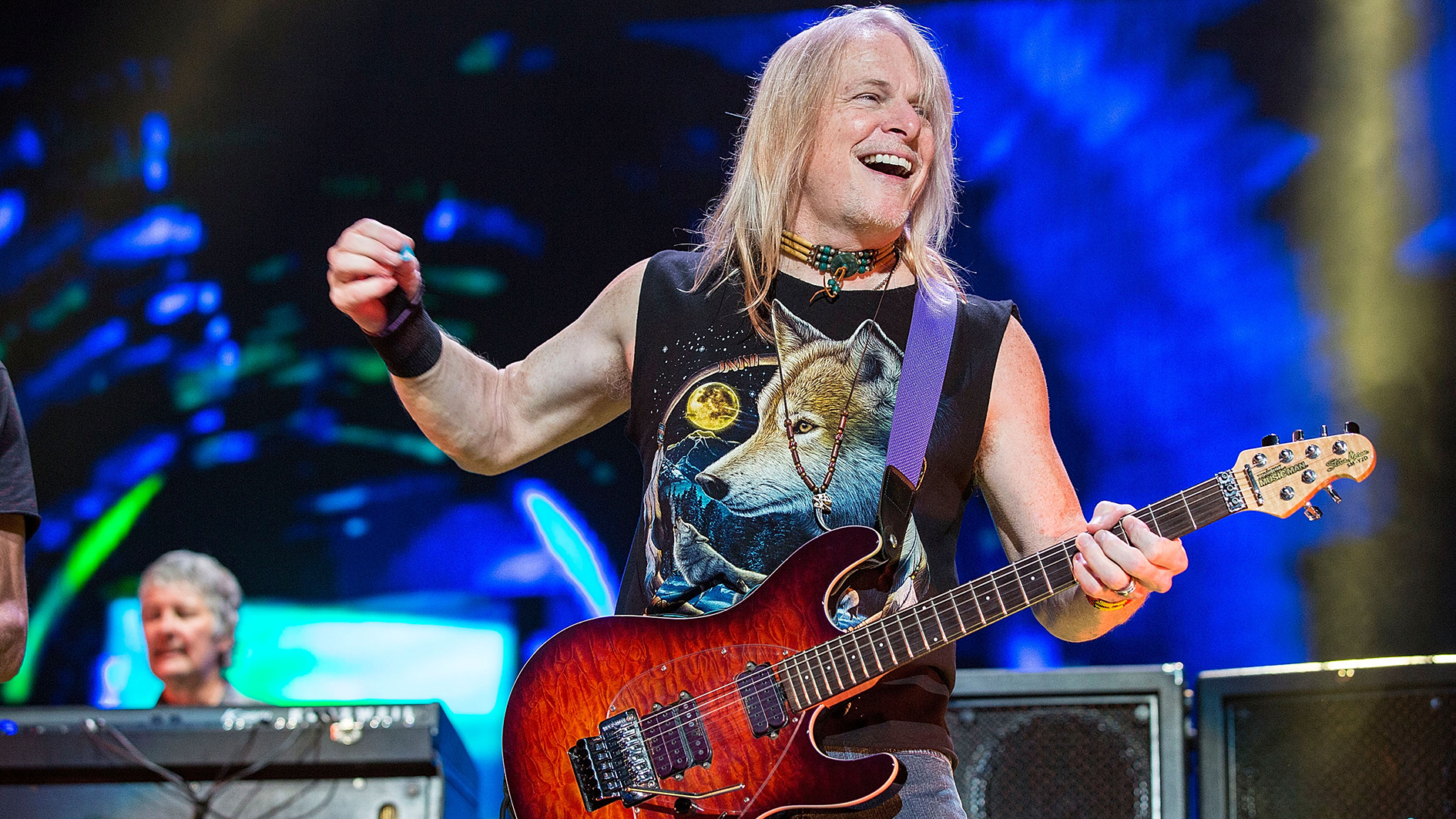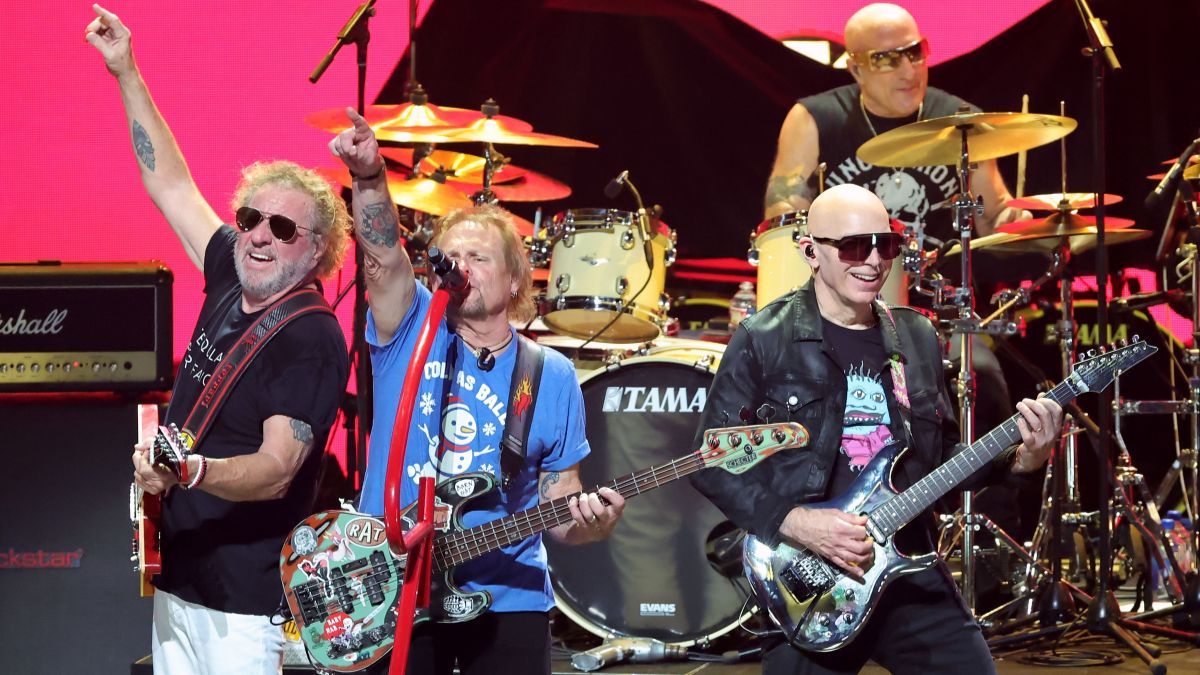Steve Morse: "Guitarists need to create dynamics on their own and not rely on the sound guy"
The Dixie Dregs, Deep Purple and Flying Colors guitarist talks live rigs, vitamin supplements and nightmare desert treks

As part of Guitarist's regular One For The Road series, the Dixie Dregs, Deep Purple and Flying Colors guitar hero details his approach to live sound, how he kits out his various Ernie Ball Music Man models and his favorite venue to play...
What was the first gig you played and how did it go?
“This was in the 60s - ’66 or ’67. We were kids and got driven to the gig by my dad with my brother’s drums, my little amp and guitar, and we met up with the other guys and played a dance.
"We did Gloria, You Really Got Me, Respect by The Rationals, not the Aretha Franklin version, then Paul Revere & The Raiders’ Steppin’ Out, and my favourite was Can’t Explain by The Who.
"In the end we got paid enough for a pizza from Domino’s - and it was the first Domino’s Pizza place in the country, up in Michigan. I had two slices that were just for me and it was awesome.”
Describe your current stage rig...
“First of all I play my Music Man guitar, the Steve Morse model. With Purple I play the three-pickup one more and with Flying Colors and The Dregs I play the four-pickup one more. That goes into a Keeley compressor that I use sometimes for boosts or rhythm stuff. On a clean sound it helps it from sounding too rinky-tink, you know?
Get The Pick Newsletter
All the latest guitar news, interviews, lessons, reviews, deals and more, direct to your inbox!
"If you set the compressor correctly it can really help bring out the single coil and double coil pickups together. Then it goes into my TC tuner and on into my ENGL Steve Morse model amp - three channels - and the best part about that amp is you can set everything on ‘6’ and it sounds amazing.

“That’s my dry amp and it goes straight to the speakers - ENGL loaded with Celestions - but the preamp out of that goes to two different TC Flashback delays and they hold whatever sound you put in them.
"I happen to put in my own presets and it has the modulation in it and I can use it for long or short delays. The long is close to 500ms; the short is as short as the pedal will do and it gives more of a chorus-y sound.
"Those are set to 100 per cent wet and are routed to two Ernie Ball volume pedals that are normally sitting up, but when you press them down the sound goes to a little passive mixer into a second Steve Morse amp - the wet amp - and its own cabinet.
"So if I want long delay I press down on the pedal and it doesn’t change the dry sound at all, it just brings up the delay. With Purple I have a third pedal for a pitch-shifter for octave down or octave up.”
What’s on your rider?
“For me, personally, it’s some sparkling water and, if I’m lucky, some Diet Dr Pepper. Sliced cheese, peanut butter and jelly, bread, some yoghurt and that’s it. My Deep Purple rider, that’s a book. What happens is that it gets passed down from one tour manager to the next and sometimes we have to tell them to take stuff off if we see that something’s out there that no-one’s using.”
You want to create dynamics on your own. Thinking that the sound man will catch your solos and bring them up and magically put you down in a great spot is a lot to ask
What’s your best tip for getting a good live sound?
“As always, you want to create dynamics or create the illusion of dynamics on your own. Thinking that the sound man will catch your solos and bring them up and magically put you down in a great spot is a lot to ask.
"So, for instance, if I’m playing a power chord and a vocalist is singing I will hit the chord and roll off the high-end on the tone control, sometimes turn it all the way down to zero while that chord’s ringing. So it has the low power of the chord and you hear the initial attack but it doesn’t stay using up all that bandwidth.

"Then when someone else is soloing I will continue playing but go to what I consider a weaker-sounding pickup - like a single coil pickup - and bring the guitar down to maybe ‘7’ or ‘6’ and play more sparsely, and mute the strings so they don’t ring as long.
"In other words, create space as another way to give dynamics. Then when I take a solo I’ll push down on the short delay and that adds another sound source.”
What non-musical item couldn’t you do without on tour?
“I would say it would be my stash of vitamin supplements. I’m up to over 12 pills and they’re all different things. If you read the labels I should be 20ft tall and green and able to lift cars with one hand…”
What’s the best venue you’ve played in and why?
“There’s been a lot of them. I remember the auditorium at Augusta College [in Georgia] – it was a small auditorium but you could see every seat in the audience and they could see you.
"The sound would travel perfectly for the levels we played at in the 70s. Everybody I went to listen to there sounded great and when we played there with the earliest Dregs, a three-piece, it just seemed perfect.”
What’s the worst journey you’ve had either to or from a gig?
“Going from Reno to Las Vegas in a truck that I owned. It was 117 degrees in the city and we started by taking the transmission out to replace the clutch, put it back in, started driving covered with grease. It’s unbelievably hot and the air conditioner stops working.
"Then the engine starts to overheat, so we’re stopping and trying to put water over the radiator, nothing we’re doing helps and we gotta get to this next gig. So we took off the entire front of the truck, disconnected all the wires for the lights and lifted it into the back so when you opened up the roll door it looked like a truck was coming at you.
"So we’re going down the highway like this and I was just riding the temperature gauge. If I went very fast it would overheat, but it was getting more air to the radiator - but then we got pulled over by a cop who wanted to give me a ticket for going too slow.
Our drummer and manager landed in Grand Rapids, Michigan, and we were in Grand Rapids, Minnesota. It reminded me of [Spinal Tap’s] stage prop being measured in inches rather than meters...
"I explained the situation and he eventually let us go, but I was driving on the shoulder doing 40 miles an hour and what should have been an afternoon’s trip took an entire day.”
What’s the nearest you’ve come to a Spinal Tap moment on tour?
“We were playing a gig in Minnesota and the travel agent had booked our drummer and manager to Grand Rapids, but the limo driver couldn’t find them. He was at the airport and they just weren’t there - and this went on for hours.
It turns out that they’d landed in Grand Rapids, Michigan, and we were in Grand Rapids, Minnesota. So they had to charter a plane and fly up to Minnesota while we waited. It kinda reminds me of [Spinal Tap’s] stage prop being measured in inches rather than meters…”
What’s your favorite live album?
“The first live album that I really got into was by Grateful Dead. Back in those days they just taped them and this was a tape that had been bequeathed to me to try to influence my playing - and, sure enough, it did. My favorite [live track] was Dark Star. That was when they were young and the jams were really lively with a lot of guitar playing, which was perfect for a young teenage kid to get into and learn from.”
- Flying Colors’ latest album, Third Degree, is available now via Mascot
With over 30 years’ experience writing for guitar magazines, including at one time occupying the role of editor for Guitarist and Guitar Techniques, David is also the best-selling author of a number of guitar books for Sanctuary Publishing, Music Sales, Mel Bay and Hal Leonard. As a player he has performed with blues sax legend Dick Heckstall-Smith, played rock ’n’ roll in Marty Wilde’s band, duetted with Martin Taylor and taken part in charity gigs backing Gary Moore, Bernie Marsden and Robbie McIntosh, among others. An avid composer of acoustic guitar instrumentals, he has released two acclaimed albums, Nocturnal and Arboretum.
“This guy kept calling saying, ‘I’ve never been in a band before, but I’m the best guitarist ever.’ When I heard him play it was like a fire from heaven”: The life and times of Killing Joke visionary Geordie Walker – the guitar hero’s guitar hero
“Such a rare piece”: Dave Navarro has chosen the guitar he’s using to record his first post-Jane’s Addiction material – and it’s a historic build








![[from left] George Harrison with his Gretsch Country Gentleman, Norman Harris of Norman's Rare Guitars holds a gold-top Les Paul, John Fogerty with his legendary 1969 Rickenbacker](https://cdn.mos.cms.futurecdn.net/TuH3nuhn9etqjdn5sy4ntW.jpg)


